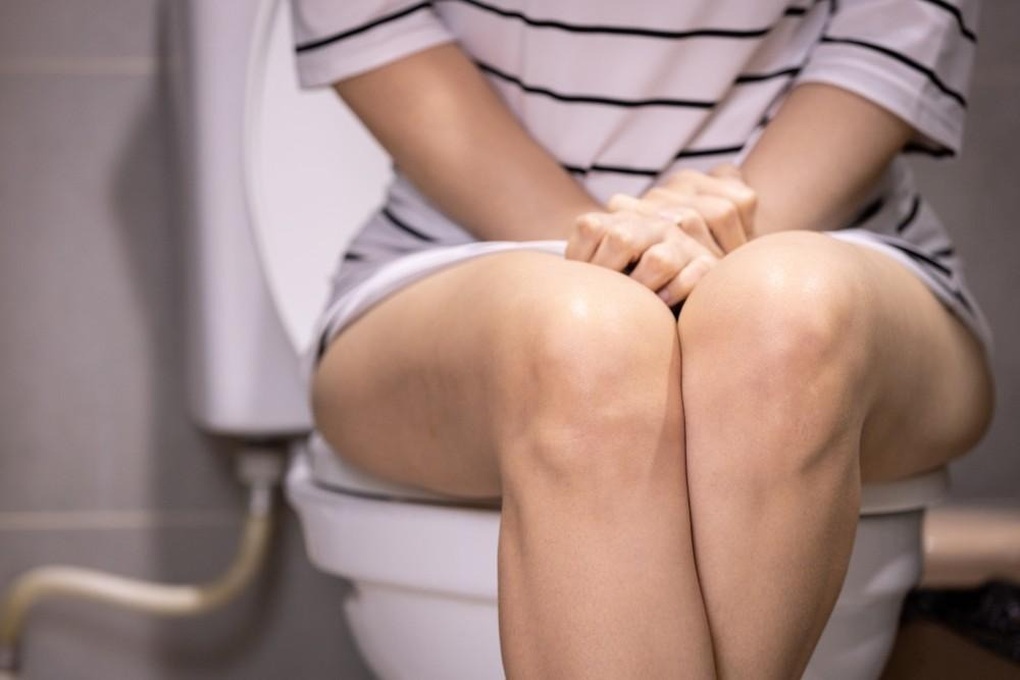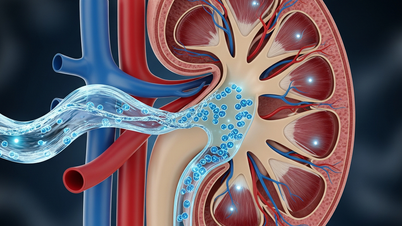The kidneys are vital organs that perform many vital functions, such as filtering blood, regulating blood pressure, and controlling water and electrolytes in the body. According to the World Health Organization (WHO), more than 10% of the global adult population suffers from chronic kidney disease, but most go undiagnosed due to subtle symptoms.
Many recent studies, including a report by the American Institute of Nephrology, show that early warning signs of kidney disease often appear at night. This is the time when the body rests but also reveals metabolic and excretory disorders.
Early recognition and treatment of nighttime symptoms not only helps protect the kidneys but also prevents dangerous complications such as high blood pressure, cardiovascular disease and multiple organ failure.

Frequent urination at night is the most obvious sign that the kidneys are having problems (Illustration: Getty).
Frequent urination at night
A healthy person usually only needs to urinate once or not need to wake up in the middle of the night. But if you have to get up 2-3 times or more, your kidneys are having problems.
According to the Cleveland Clinic , frequent urination at night often occurs when the kidneys are no longer able to concentrate urine as well as usual. Instead of retaining water at night, the kidneys continue to empty the bladder quickly, disrupting sleep.
A study published in the journal Nature Scientific Reports found that people with mildly reduced kidney function were 2.2 times more likely to have nocturia than those with normal kidney function. This could be one of the early signs of chronic kidney disease (CKD), which affects more than 800 million people worldwide.
Mild swelling in the evening
When the kidneys fail, the process of removing salt and water from the blood is disrupted. Excess fluid begins to accumulate in the tissues, causing mild swelling in the ankles, feet, eyelids, or around the eyes.
It is worth noting that renal edema is often more obvious in the evening. This is a manifestation of sodium imbalance in the body.
Specifically, the patient may feel that shoes are tighter, rings are difficult to remove, or the face is slightly swollen when looking in the mirror at night. In addition, symptoms of slight weight gain without clear cause (0.5-1kg/day) are also signs that the kidneys are retaining water.
Fatigue, difficulty sleeping or night cramps
The kidneys help maintain the balance of minerals like sodium, potassium, calcium, and phosphorus. When these organs fail, electrolyte imbalances can lead to cramps, muscle pain, or numbness at night.
According to a study published in the Sleep Medicine Journal in 2020, up to half of patients with chronic kidney failure experience sleep disorders, especially restless leg syndrome. At this time, patients feel restless and uncomfortable in their legs, having to constantly move to fall asleep.
In addition, the accumulation of urea in the blood makes many people feel tired and lethargic even after getting enough sleep. This is a condition called uremia, a warning that the kidneys are losing their filtering function.
Back or hip pain when lying down
The two kidneys are located symmetrically on both sides of the spine, above the waist. When inflamed, infected or blocked by stones, the patient may feel a dull or sharp pain in the flank, especially when lying down at night.

Back pain is also a sign that the kidneys are crying for help (Illustration: Getty).
According to the American Society of Nephrology, kidney pain is characterized by a dull, deep ache that does not change with position. This pain is different from muscle pain or spinal pain. If accompanied by fever, chills or cloudy urine, the patient may have acute pyelonephritis and should seek medical attention immediately.
Some patients also reported increased pain at night due to changes in lying position causing pressure in the abdomen, temporarily obstructing blood flow through the kidneys.
Foamy or discolored urine
Urine is a “mirror” of kidney function. If you notice that your urine is foamy, dark, or bloody, especially at night, it is likely that your kidneys are leaking protein.
According to the Mayo Clinic, this phenomenon shows that the glomerular filtration barrier is damaged, causing protein in the blood to leak out. The disease progresses silently but over time will lead to chronic kidney failure.
Additionally, urine that has a strong ammonia odor, is cloudy or thick can also be a sign of a urinary tract infection or chronic dehydration. Both of these can have a negative impact on the kidneys if not treated promptly.
Shortness of breath or palpitations when lying down
Weak kidneys cause the body to retain fluid, causing pulmonary edema or mild pleural effusion. This condition causes difficulty breathing, chest tightness, and a feeling of being out of breath when lying down.
The American Heart Association warns that this condition can be caused by hyperkalemia, a dangerous complication that occurs when the kidneys are unable to eliminate excess potassium. Patients may experience rapid heartbeat, palpitations, or even fainting if potassium levels become too high.
Therefore, if you experience difficulty breathing at night with swelling, fatigue or rapid heartbeat, you need to go to the hospital for a heart-lung ultrasound and blood tests to determine the exact cause.
Dry skin, itching at night
Dry skin and persistent itching, especially at night, is a fairly typical sign of chronic kidney disease. As the filtering function decreases, nitrogen and urea toxins accumulate in the blood, causing a feeling of itching that spreads throughout the body, especially in the back and limbs.
According to the National Institute of Diabetes and Kidney Diseases, more than 40% of people with kidney failure experience persistent itching. This symptom is often not relieved by applying moisturizer.

More than 40% of kidney failure patients experience persistent itching (Photo: Getty).
Why do symptoms of weak kidneys easily appear at night?
According to experts, at night is when the body is at rest, blood circulation is slower and osmotic pressure changes, making symptoms of fluid retention, fatigue or pain more noticeable.
In addition, age-related decreases in antidiuretic hormone also cause older adults to urinate more frequently at night, contributing to the clarification of potential signs of kidney disease.
Therefore, doctors recommend that if people experience two or more symptoms that recur over several days, they should go to the hospital to check their kidney function and detect the disease early if they are unfortunate enough to contract it.
This can help with prompt treatment, slow progression, and prevent complications such as chronic kidney failure, high blood pressure, heart disease, or anemia.
Source: https://dantri.com.vn/suc-khoe/7-dau-hieu-cho-thay-than-keu-cuu-vao-ban-dem-20251014170223629.htm




![[Photo] Closing ceremony of the 18th Congress of Hanoi Party Committee](https://vphoto.vietnam.vn/thumb/1200x675/vietnam/resource/IMAGE/2025/10/17/1760704850107_ndo_br_1-jpg.webp)






























![[Photo] Nhan Dan Newspaper launches “Fatherland in the Heart: The Concert Film”](https://vphoto.vietnam.vn/thumb/1200x675/vietnam/resource/IMAGE/2025/10/16/1760622132545_thiet-ke-chua-co-ten-36-png.webp)





































































Comment (0)